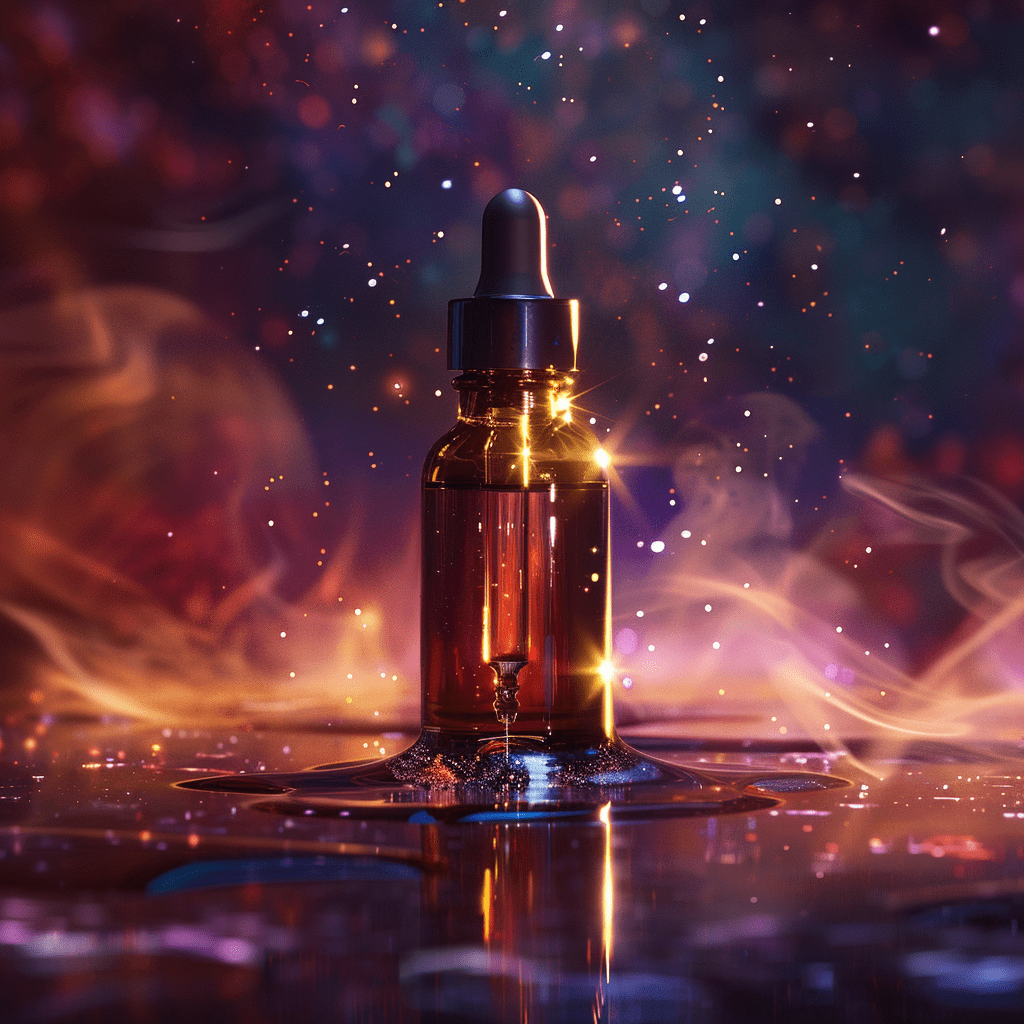Are you thinking about using CBD oil for sleep in Australia? It’s already frequently used by countless people to help get a better night’s rest.

But increasing numbers of people also now find CBD helpful for insomnia.
There are a few reasons why this is the case.
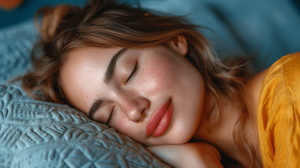
CBD can promote better sleep by supporting circadian rhythm and the brain’s sleep-wake cycles. It does this through modulating the endocannabinoid system. In doing so, it acts on cannabinoid receptors in the brain. These can influence how we sleep through endocannabinoid release.

It additionally provides people with a natural means to calm down at night. Using CBD in Australia is now very popular as a way to fall asleep faster. Relaxation of the mind at bedtime aids in nodding off.
But CBD oil even helps with insomnia. It bolsters sleep health, quality and continuity. Preventing sleep from being disrupted by anxiety, stress or sleep disorders is vital to this.

Getting enough sleep is crucial for maintaining good health and well-being. However, more than half of Australians have some form of chronic sleep problem. These problems detrimentally affect their physical and mental well-being. Avoiding this is vital. It’s no wonder taking CBD oil for sleep and insomnia has seen considerable increases in popularity. CBD is the ideal sleep aid.
Discover the best CBD oil for sleep in Australia and its benefits for insomnia. This natural cannabis extract can help you get more restorative, deep periods of sleep.
Contents
Does CBD Work as a Sleep Aid?
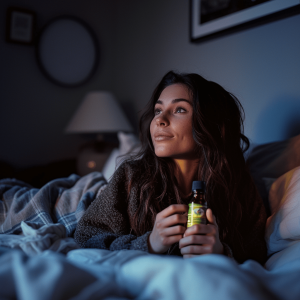
Using CBD as a sleep aid is valuable.
It has various properties that promote better sleep. Most people are aware of its ability to help with inflammation, anxiety or pain.
But its usefulness in calming users at night can’t be understated.
CBD is tremendous for sleep health.

It doesn’t just help with relaxing into more profound rest. Leveraging CBD oil for sleep means getting deeper, longer, higher-quality slumber.
Best of all, it’s all-natural and can be used daily without causing health problems. This makes it a great alternative to pharmaceutical sleep medications, which can cause grogginess or insomnia.

It’s positioned more similarly to melatonin and natural compounds that assist with sleep without causing significant daytime drowsiness or worsening insomnia. Let’s look at the top benefits of using CBD oil for sleep.
Preventing Sleep Disruption from Anxiety
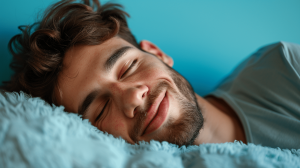
Possibly, the best way CBD helps with insomnia is by preventing anxiety from damaging sleep quality.
Using it helps calm you down before bed. Its relaxing qualities help prime the mind for sleep. CBD is an anxiolytic compound.
This means it can alleviate stress, anxiety and overthinking. Anxiety commonly strikes at bedtime. Being anxious when you need to sleep will delay sleep onset.
Many use CBD oil in Australia before sleep to prevent these problems.

It facilitates better sleep by preventing stress hormones from being released at night. Cortisol (the primary stress hormone) can delay sleep and reduce depth.
When you’re stressed at bedtime, excessive worry and anxiousness result. This causes the sympathetic nervous system to become overactive. Alertness in this overactive nervous state impairs sleep. Relaxation is needed to stop these issues and get to sleep on time.

This is where CBD oil helps with insomnia.
It enables a smoother shift from sympathetic to relaxed nervous states at night. A few drops of CBD at bedtime accompany calmness and mental ease. It’s particularly effective in individuals who suffer from anxiety, which can continuously affect their sleep. Anxiety reduces REM sleep stages and causes shallow sleep depth.
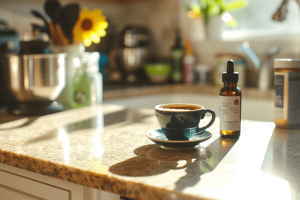
Counteracting this by taking CBD gummies or oil an hour before bed is robust. Combined with a good nighttime routine for calmness, it’s ideal for regaining control of your sleeping pattern.
Accounting for the nervous system and its activity is critical to sleep health. With CBD for sleep, let your brain and body shift into a deep, restorative rest.
Supporting Circadian Rhythm

Another way CBD oil works as a sleep aid is by strengthening circadian rhythm.
Within the brain, our sleep-wake cycle or circadian rhythm controls when we fall asleep and wake up. It’s a core pillar of sleep health. Circadian cycles dictate how long we sleep and influence sleep stages. Maintaining a regular, consistent rhythm can be a challenge for those with insomnia.
CBD can assist with circadian rhythm regularity via endocannabinoid system activation. This system helps regulate homeostasis and sleep. Endocannabinoids produced in the brain’s CB1 receptors help reinforce our sleep-wake cycles in response to CBD. Many endocannabinoids like 2-AG promote circadian regularity and prevent sleep disruption.
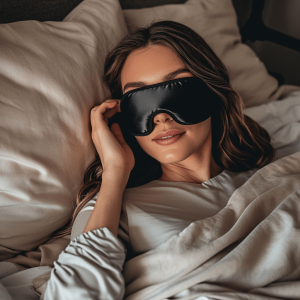
Additionally, using CBD oil for sleep may aid with sleep neurotransmitter regulation. A complex interplay of neurotransmitters is involved in regulating sleep. This includes serotonin, GABA and norephedrine. Each works to stimulate sleep-wake cycles within the brain. It’s thought that CBD’s ability to act on our GABA and serotonin receptors contributes to its sleep-promoting effects.
In particular, the GABA production it stimulates in the hypothalamus calms the mind. GABA helps to reduce anxiousness and lower norephedrine levels. Doing so means the sympathetic nervous system is more rapidly relaxed. This primes the brain for deeper sleep. Activating GABA pathways helps those using CBD sleep on time each night. Plus, they sleep more deeply. You might find this beneficial if you have mild insomnia. Often, people use CBD to combat insomnia from jet lag or want to regain a more consistent sleep pattern.
Aiding REM-Stage Sleep
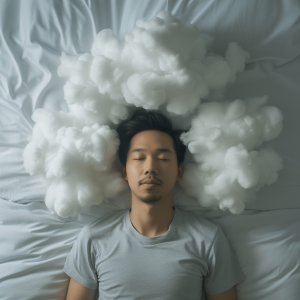
Interestingly, it’s been uncovered that CBD assists with REM sleep quality.
REM (rapid eye movement) stage sleep is the most beneficial sleep phase. It’s where most of the therapeutic effects of sleep occur for the brain. Research shows CBD can increase the length of REM stage cycles.
It is thought to influence REM through endocannabinoid and neurotransmitter modulation. Studies have indicated the use of CBD oil for insomnia is particularly beneficial for those with stress or anxiety. These mental ailments can adversely affect sleep quality through reductions in REM.
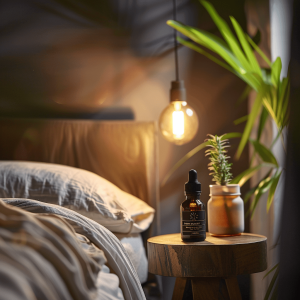
CBD can suppress sleep-damaging effects. It can also calm the mind and lead to a deeper sleep with more REM.
CBD may offer additional relief for those with RBD or REM sleep behaviour disorder. This condition causes night terrors and makes it nearly impossible to get adequate REM sleep each night. Yet, it can be frustratingly hard to remedy. While it won’t work for everyone, CBD may be worth a try to help with REM sleep behaviour disorder. Its properties in stabilising REM sleep work to suppress the condition’s severity. Often, it reduces the impact of RBD episodes.
Reducing Pain for Sleep

Some find CBD helps block pain, which can impact their sleep.
Various forms of chronic pain commonly cause insomnia. For instance, if you have a nagging injury, the uncomfortable sensations it stimulates may prevent you from falling asleep each night.
Problems like ongoing nerve pain can often cause severe discomfort. Expecting this discomfort during sleep can also create forms of anxiety. In turn, alertness at night will increase, resulting in greater wakefulness and damaged sleep.
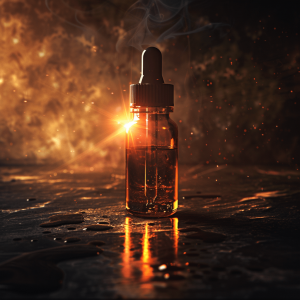
Pain can also cause intermittent waking or issues staying asleep. CBD’s analgesic properties help counteract this.
It’s another pathway that CBD helps many with sleep. Specifically, CBD helps lower our perception of pain in nerve signals. This is called ‘nociception’. It does this by altering how the nervous system signals through endocannabinoid activity. By dampening nociception, pain sensations become less impactful. They can be more easily tolerated. Avoiding insomnia from pain is an excellent reason to use CBD oil for sleep. Keep in mind it’s best for neuropathic (nerve) pain. Other pain types tend to see less usefulness from CBD.
Benefits of CBD Oil for Insomnia

We’ve covered how CBD helps with sleep. But can it more directly assist with sleep disorders like insomnia?
The answer is much less clear.
Although it is potent for boosting holistic sleep health, the research doesn’t back CBD as a treatment for insomnia. CBD has low efficacy in treating most real sleep disorders. Studies have displayed mixed results in its ability to counteract insomnia.

This doesn’t mean it’s entirely useless, however.
Its benefits for limiting insomnia symptoms are highly individual. Some with minor insomnia symptoms do tend to see some benefit from taking CBD oil at bedtime. Similarly, for disorders like sleep apnoea or narcolepsy, results from using CBD have been mixed. More clinical studies are needed for conclusive evidence on whether CBD can help. Let’s look at each of these sleep disorders and whether CBD might offer some relief.
Insomnia
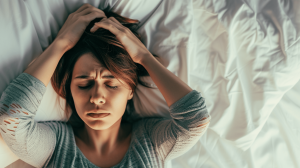
Using CBD oil for insomnia doesn’t look like an effective treatment. Clinical studies on its usefulness to date have been mixed.
Insomnia is a category of sleep disorders that includes delayed sleep, early wake-ups or intermittent wakefulness. It can vary substantially in severity. Some people will experience mild insomnia infrequently. Others may have severe, persistent forms of the disorder.

Sleeplessness from insomnia significantly damages our health. It detrimentally impacts:
- Daytime focus
- Mood
- Mental and physical energy levels
- Immunity
- Ability to recover from exercise
It’s also a significant risk factor for more severe health conditions like depression and obesity.
Some types of insomnia are directly caused by anxiety at night. Due to being anxiolytic, CBD can help with this insomnia type. It does so by suppressing anxiousness to stop it from impacting sleep.
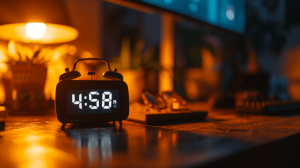
CBD helps lower norephedrine and cortisol at night. These stress hormones keep us awake or alert, even when exhausted. CBD excels at blocking stress to prevent the stress hormones from triggering insomnia. Alleviating nervous, racing thoughts at bedtime helps with getting to sleep.
Using CBD oil for insomnia won’t always help. But if your insomnia is mild or caused by anxiety, it very likely can assist. It’s often worth trying. But before doing so, check with your doctor to see if it’s suitable. Frequently, insomnia is caused by underlying conditions that need treatment. Using CBD products as a band-aid fix in these instances is misguided.
Sleep Apnoea

Interestingly, some studies have indicated that CBD oil displays benefits for sleep apnoea.
This disorder causes breathing problems at night that result in intermittent waking. It’s surprisingly common.
Around 5% of people in Australia suffer from sleep apnea. It can cause poor sleep quality and daytime drowsiness. In some cases, it’s even a contributor to insomnia or more severe sleep disorders.
Initial studies on CBD for sleep apnoea have been promising.
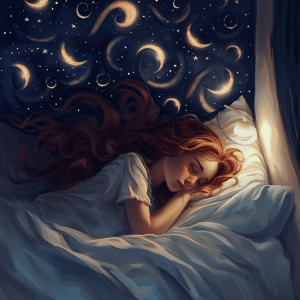
Studies have shown its ability to prevent apnoea in rodent models and small-scale human studies. These studies revealed that CBD oil dosing before sleep reduced the frequency and severity of apnoea symptoms. In doing so, sleep quality was reinforced. Issues with insomnia or intermittent waking were suppressed.
The specific mechanism for how CBD helps with sleep apnea isn’t fully clear. Current theories suggest that serotonin modulation helps prevent apnea. Serotonin plays a role in sleep apnea because it influences the regulation of breathing. Acting on the serotonin receptors somehow enables CBD to normalise breathing during sleep.
Keep in mind that these studies used low doses of CBD oil. The cannabinoid’s benefits also appeared to be somewhat unreliable. Its efficacy was inconsistent across individuals tested. Yet, preventing sleep apnea seems to be a key benefit of CBD for some.
Narcolepsy

Simply put, narcolepsy is daytime sleepiness. It’s considered a sleep disorder.
During the day, one expects to be alert, energised and focused. But when narcolepsy occurs, the opposite is true.
Individuals with this condition experience:
- Lethargy and exhaustion
- Severe drowsiness
- Sleepiness or intermittent napping
- Weak concentration
These problems tend to happen during the day, which can be particularly painful for those who work, study, or need to focus during daylight hours.

It’s also common for those with narcolepsy to fall asleep during the day. This can disrupt circadian rhythm and worsen sleep problems.
So far, research on CBD’s capacity to assist with narcolepsy is minimal. It has shown mixed results in treating daytime sleepiness. It may worsen narcolepsy for some people. CBD’s relaxing, anxiolytic properties can cause increased drowsiness in the day.
While using CBD oil for sleep is excellent in many ways, taking it for narcolepsy doesn’t look like one.
REM Sleep Disorder

Promisingly, CBD oil appears useful for REM Sleep Disorder.
During REM Sleep Disorder, individuals act aggressively within REM-stage sleep cycles. They often thrash or punch involuntarily. This can be detrimental for couples who sleep in the same bed. Those with the disorder frequently disrupt their partner’s sleep. However, it also worsens REM sleep and lowers overall sleep quality.
In small-scale trials amongst individuals with REM sleep disorder, CBD showed the ability to counteract its symptoms. Doses of CBD oil at night appeared to normalise behaviour during REM sleep. Thrashing and movement were reduced substantially. This was an early trial on only four individuals, though. Follow-up research is needed to confirm CBD’s usefulness. Using CBD as a sleep aid again appears to have valuable advantages.
What’s the Best CBD Oil for Sleep in Australia?
There isn’t a single ‘best’ CBD oil for sleep in Australia. Each product has varying benefits and advantages. Full-spectrum CBD oil, for example, contains minor cannabinoids like CBN that amplify the product’s sleep benefits. Additionally, full-spectrum formulated CBD products contain terpenes like linalool. These are naturally calming compounds that help relax the mind. They also bolster CBD’s existing potency for sleep.
Isolate CBD products contain higher quantities of the CBD cannabinoid. As such, they’re better for people who need more significant amounts of CBD to see benefits for their insomnia. However, they tend to have reduced benefits overall due to lacking terpenes and minor cannabinoid content.
The ‘best’ CBD oil for sleep in Australia is individual. It’s dependent on your own needs. Whatever you choose, though, make sure you avoid THC in any product you buy. It damages sleep and must be avoided. Broad-spectrum formulated products are an excellent middle ground, offering the potent benefits of terpenes but without containing any THC. We recommend exploring providers like Black Sheep Farms or Premium Jane in Australia. Both have excellent CBD oil for insomnia that is organic and fully certified.
Evidence for CBD’s Sleep Benefits

It should be emphasised that the overall body of research on CBD for sleep is limited.
Some studies have been conducted. However, more is needed to corroborate their results.
Despite the small number of studies on CBD for insomnia or sleep, early trials have been promising.
A 2019 study on 103 participants who had a sleep disorder due to anxiety demonstrated CBD oil’s power to promote sleep health. Researchers gave subjects CBD oil for sleep each night. They aimed to learn about its effects on their sleep-wake patterns over three months. Three to six CBD drops were administered each night before bed. The study was a marked success, mainly due to CBD’s anxiety-lowering properties.

Dosing it nightly reduced anxiousness and stress in subjects. In turn, this boosted their sleep quality and length. More than two-thirds of subjects reported more restorative sleep during the trial.
Separate studies have backed these findings. Several have identified CBD as a sleep-enhancing compound. However, they similarly found it best used for sleep problems caused by anxiety. CBD’s anxiolytic effects are potent and proven. It’s easy to understand how it helps stressed individuals sleep better.
Researchers have also noted that CBD is more effective for sleep in short-term use. The reason for this is tolerance to the cannabinoid.

Taking CBD oil long-term has ‘diminishing returns’. Homeostasis reduces its effectiveness over time. This occurs with many compounds for sleep, like melatonin. The brain adapts to these compounds, making them less potent over time.
It’s important to note. Using CBD oil shouldn’t be a long-term fix for sleep problems. It’s best taken for getting sleeping patterns back on track or helping with mild insomnia bouts. Chronic or severe insomnia requires other treatment options. Keep this in mind if you’re thinking about taking CBD for insomnia.
How to Use CBD for Sleep
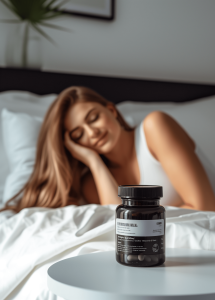
How do you take CBD oil for sleep?
It’s simple but requires experimentation. Testing different approaches helps you find the best for your unique sleep patterns.
Before trying CBD for sleep, check with your doctor first. They can help advise on whether it is suitable. If you have insomnia, this is particularly important. For some people, CBD can worsen their symptoms.
You should also avoid taking CBD oil with any other sleep medications until you’ve confirmed with your doctor it’s safe to do so.
With these tips in mind, let’s cover how to take CBD oil for sleep.
Dosage

When using CBD for sleep, dosage significantly affects success rates. To begin with, use very conservative doses. Several drops before bed should suffice.
Gauge your tolerance to CBD and check for any side effects. Based on your results, you can increase your dosage over time.
Most people find low doses under 300mg per night work best. It may seem counterintuitive, but often, higher doses of CBD oil are less effective for sleep.
Using over 300mg each night often worsens sleep. Side effect risks heighten at very large quantities. It can trigger grogginess or tiredness the day after use.
But for some, high dosages are needed. This is often true for those with anxiety that impacts their sleep.
When dosing CBD for sleep, a good principle is to find the lowest dose that works for you. Minimising dosages helps reduce the risks of side effects and tolerance build-up.
Dose Timing for Sleep

When it comes to using CBD for sleep, timing matters.
That’s because CBD hits a peak effect after a particular duration. Timing this peak at the time you want to sleep helps to improve effectiveness.
Most people use their CBD gummies or oils an hour or two before sleep to achieve this outcome.
This is the best approach in timing doses for sleep quality. It’s particularly significant if you suffer from nighttime anxiety or stress. Using CBD gummies in your pre-sleep routine will show benefits over time. But remember, the best results can take a few days or weeks. Stay persistent.
Another approach is to use CBD oil daily to lower stress overall. This should also improve sleep. You’ll be more relaxed in the evening, making nodding off easier.
Methods of Ingestion

While CBD oil is the most common product for sleep purposes, it’s not the only option available.
Try out CBD gummies, capsules, sprays or even sublingual for sleep. Each will still deliver the same benefits as oil. Which you choose is up to your tastes.
There isn’t a single ‘best’ method. Many find CBD gummies before bed tastier as a nighttime treat.
Try out a few products to see which you prefer. Changing later on is easy.
More important than the CBD product for sleep you use is what cannabinoids it contains.
Mainly whether it contains THC. THC should be avoided because of its psychoactivity. It worsens sleep and reduces REM stage length. But it is unfortunately found quite frequently in low-quality Australian CBD products.
To avoid THC, seek out lab analysis for the CBD oil in Australia when you’re buying. This ensures you know what cannabinoids are in the product. Check this report does not list THC.
CBD Tolerance

A common complaint people have is that CBD oil ‘stops working’ for their insomnia or sleep.
This should be expected.
The brain builds a tolerance to CBD. Homeostasis causes this.
Taking CBD every single night will mean you need higher doses to achieve the same sleep benefits over time. Many people opt to cycle it to prevent this and minimise tolerance. Taking breaks from using CBD for sleep can also help. Try alternating it with other natural sleep aids like melatonin. These won’t have cross-tolerance. You can use both to have a significant and sustainable effect.
Additionally, using minimal amounts of CBD helps slow tolerance from building up. Commonly, people take it for particularly stressful nights where it can offer more benefits.
Tolerance to CBD is inevitable. It’s best applied for short-term periods of use when targeting insomnia.
Side Effects & Risks
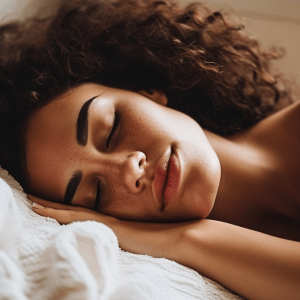
Taking CBD oil to help with sleep is safe. However, there can be some side effects in rare cases.
For instance, some report mild drowsiness, stomach aches, dry mouth, or appetite changes. These can occur but generally will rapidly pass. A critical risk to avoid is mixing CBD with other medications. You may be using existing insomnia medications or sleeping pills. Don’t take CBD with them until you ask your doctor first. Doing so could cause adverse health effects. However, it is well-tolerated, natural and safe for most people.
Even at very high doses, it appears to have minimal side effect risks and can’t cause addiction.
Is CBD Safe to Use as a Sleep Aid?

In most people, CBD products in Australia are entirely safe to take for sleep.
An exception is products that contain the psychoactive THC cannabinoid. Only purchase CBD sleep products derived from industrial hemp plants (which don’t contain THC).
Unlike THC, CBD has no psychoactive effects. It doesn’t carry the risk of causing issues with mental health that can be triggered by psychoactive compounds like THC (the other prominent cannabinoid).
Check with your local doctor before using CBD for sleep. You’ll need to ensure it’s a good fit for you. Treating insomnia with it, for instance, usually doesn’t work. Doctors can also advise if you should explore other options.
For example, if you have insomnia, cognitive or sleep therapy may be more suitable. They’ll also be able to give you a better understanding of CBD’s risks for other health conditions you may have.
Conclusion
If you’re considering CBD oil for sleep in Australia, it’s certainly worth exploring.
Many rely on it today as a natural, hemp-derived sleep aid.
There are a few ways that CBD helps with sleep. It may even mitigate minor insomnia and sleep problems.
As mentioned in our review here, the primary benefits of CBD for sleep health are:
- Reducing anxiety, which can impair sleep and cause insomnia.
- Lowering stress at night to aid with getting to sleep.
- Reinforcing circadian rhythm via endocannabinoid activity.
- Supporting REM stage length and overall sleep quality.
- Helping to counteract sleep apnoea and REM sleep disorder.
- Blocking some pain types can impact sleep health.
The cannabinoid’s activity in the brain’s CB1 receptors is the primary mechanism by which it promotes better sleep. However, it additionally has particular interactions with GABA and serotonin, which contribute to the
It’s vital to keep in mind that CBD isn’t going to cure insomnia. Treating it as a sleep medication isn’t accurate.
Using it correctly means taking as little as possible and not relying on it. The best results from CBD gummies or oil from sleep come from adding it as a support pillar to an already robust sleep protocol.
It’s also most effective when used to combat stress or anxiety that damages sleep. This is because of CBD’s potent calming capacities.
In any case, try it. A few CBD drops at bedtime should help with more consistent, refreshing, high-quality rests.
FAQs
CBD benefits sleep primarily by addressing factors like anxiety and stress that can contribute to sleep disturbances. It additionally can help support circadian rhythm regulation, sleep quality, and REM-stage length through the endocannabinoid system, which plays a role in regulating mood and sleep. Most individuals use CBD an hour or two before bed to help them relax into more restorative, deep sleep.
CBD and melatonin serve different roles in sleep regulation. Melatonin is a hormone that helps regulate the sleep-wake cycle. It is a natural chemical the brain secretes to stimulate tiredness. On the other hand, CBD is a non-intoxicating cannabinoid extracted from the cannabis sativa plant. It can help address sleep issues by aiding with relaxation at night.
Whether CBD is “better” than melatonin depends on the individual’s specific sleep issues. CBD oil tends to be better at mitigating anxiety-related insomnia or sleep impairment. Due to its serotonin interactions, it’s also beneficial in counteracting sleep apnea and REM sleep disorders.
Melatonin works better for rebalancing the sleep cycle after jet lag or insomnia. Some individuals may find one more effective than the other.
To buy CBD oil for insomnia in Australia, we recommend looking online. Although you can now buy CBD oil in pharmacies and dispensaries in Australia, it’s costly. These locations mark up their products significantly. They’re also very constrained on what they can offer in terms of product strength and formulation. Buying CBD oil online gives more flexibility and cost savings. Shop around in Australia for the best CBD products. It’s wise to try out several different stores and products before settling on one. Ensure you get a lab analysis for anything you buy to avoid fakes. If in doubt, check in with your GP. A prescription CBD oil for insomnia will be high quality but costs much more than online offerings.
Both CBD and melatonin can each offer benefits for insomnia, depending on the individual and their particular condition. Each is a natural compound that can assist with sleep pattern regulation, nighttime calmness, sleep quality and length. For those with insomnia caused by stress or anxiety, CBD is much more advantageous as it is anxiolytic. It helps users relax and primes the mind for sleep to avoid sleeplessness. Melatonin is better used to help trigger sleepiness at night to influence the sleep-wake cycle. Some individuals find a combination of both to be beneficial. Note that severe insomnia is less responsive to both compounds. It needs medical treatment.
Lower dosages of CBD are more effective in helping with sleep or insomnia for the majority of people. Studies have shown that 150mg or less of CBD per night offered the most significant improvements in bouts of minor insomnia, particularly among users with anxiety. High doses above 300mg per night often worsened insomnia or had mixed results. An optimal dose is individual; everyone responds differently to cannabinoids like CBD. Check with your doctor if you have a sleep disorder, as CBD may not be suitable in all cases.
Magnesium is safe to take with CBD oil. It can help amplify CBD’s soothing effects as a nervous system relaxant. It’s frequently used to relieve stress symptoms. Taking it alongside CBD oil for sleep at night helps the nervous system transition into a rest state.
Research to date has displayed mixed results for CBD products as an insomnia treatment. Studies have shown these are most effective when insomnia is anxiety-related. CBD has no evidence of its efficacy for other forms of insomnia. It can help in some instances as a complementary sleep aid. For insomnia, it is crucial not to view CBD products as ‘treatments’. If you have a sleep disorder, checking with your doctor on appropriate solutions is the best step to take. It would help if you also prioritised sleep hygiene. Keep a consistent sleep schedule and a conducive sleep environment.
Overall, CBD oil is safer than sleeping pills because it’s less potent and doesn’t impact neurotransmitter levels as powerfully. Sleeping pills, such as benzodiazepines or non-benzodiazepine sedative-hypnotics, have a range of side effects. For instance, they can cause drowsiness, dizziness, headaches, gastrointestinal disturbances, and next-day grogginess. Many are also addictive. Benzodiazepine, for example, is very habit-forming and can rapidly cause dependence. These downsides are far more significant than those of CBD. Cannabidiol is milder and has no addictive properties. It also has fewer, rarer side effects. Most tolerate it very well and don’t experience any adverse reactions.
Valerian Root: Valerian root is an herbal supplement. It helps with stress and anxiety, similar to CBD. While less effective, it may be a viable CBD alternative for some people. The root has soothing properties that can help promote relaxation and improve sleep quality. Valerian root is available in various forms, including capsules, tablets, and teas.
Magnesium: Magnesium is a mineral that plays a role in bodily functions, including sleep regulation. Supplemental magnesium has been shown to improve sleep quality. It’s particularly effective in individuals with magnesium deficiency. The best formulations of magnesium for sleep are magnesium threonat and glycinate. These are more bioavailable and fast-absorbing than other forms of the mineral.
Lifestyle Changes: lifestyle changes can improve sleep health. A regular sleep schedule, a relaxing bedtime routine and no screen exposure before bed are all critical.
CBD oil typically does not cause next-day grogginess in the same way that traditional sleep medications can. It is natural and mild, making it less likely to cause daytime drowsiness. However, some people are more susceptible to its effects and do see some grogginess after taking it for sleep. Dosage can also play a part in this side effect. Overusing CBD oil or incorrectly dosing is likely to increase the risk of feeling groggy.
References
- Sleep Foundation. (2021). Is Cannabidiol a Safe and Effective Sleep Aid? [online] Available at: https://www.sleepfoundation.org/sleep-aids/cbd-for-sleep#:~:text=CBD%20is%20commonly%20used%20to%20improve%20sleep%20and%20decrease%20anxiety.
- Siegel, J.M. (2004). The neurotransmitters of sleep. The Journal of Clinical Psychiatry, [online] 65 Suppl 16, pp.4–7. Available at: https://pubmed.ncbi.nlm.nih.gov/15575797/#:~:text=The%20part%20of%20the%20brain.
- Kaul, M., Zee, P.C. and Sahni, A.S. (2021). Effects of Cannabinoids on Sleep and their Therapeutic Potential for Sleep Disorders. Neurotherapeutics, 18. https://www.ncbi.nlm.nih.gov/pmc/articles/PMC8116407/
- Moltke, J. and Hindocha, C. (2021). Reasons for cannabidiol use: a cross-sectional study of CBD users, focusing on self-perceived stress, anxiety, and sleep problems. Journal of Cannabis Research, 3(1). https://jcannabisresearch.biomedcentral.com/articles/10.1186/s42238-021-00061-5
- Australia, H. (2023). Obstructive sleep apnoea. [online] www.healthdirect.gov.au. Available at: https://www.healthdirect.gov.au/obstructive-sleep-apnoea#:~:text=Sleep%20apnoea%20is%20not%20just.
- Kuhathasan, N., Dufort, A., MacKillop, J., Gottschalk, R., Minuzzi, L. and Frey, B.N. (2019). The use of cannabinoids for sleep: A critical review on clinical trials. Experimental and Clinical Psychopharmacology, 27(4), pp.383–401. https://pubmed.ncbi.nlm.nih.gov/31120284/
- Arab, A., Rafie, N., Amani, R. and Shirani, F. (2022). The Role of Magnesium in Sleep Health: a Systematic Review of Available Literature. Biological Trace Element Research. [online] https://pubmed.ncbi.nlm.nih.gov/35184264/
- Shannon, S. (2016b). Effectiveness of Cannabidiol Oil for Pediatric Anxiety and Insomnia as Part of Posttraumatic Stress Disorder: A Case Report. The Permanente Journal, 20(4). https://www.ncbi.nlm.nih.gov/pmc/articles/PMC5101100/
- Kolla, B.P., Hayes, L., Cox, C., Eatwell, L., Deyo-Svendsen, M. and Mansukhani, M.P. (2022). The Effects of Cannabinoids on Sleep. Journal of Primary Care & Community Health, 13, p.215013192210812. https://journals.sagepub.com/doi/10.1177/21501319221081277
- Ramar, K., Rosen, I.M., Kirsch, D.B., Chervin, R.D., Carden, K.A., Aurora, R.N., Kristo, D.A., Malhotra, R.K., Martin, J.L., Olson, E.J., Rosen, C.L. and Rowley, J.A. (2018). Medical Cannabis and the Treatment of Obstructive Sleep Apnea: An American Academy of Sleep Medicine Position Statement. Journal of Clinical Sleep Medicine, [online] 14(04), pp.679–681. https://www.ncbi.nlm.nih.gov/pmc/articles/PMC5886446/
- Narayan, A.J., Downey, L.A., Rose, S., Lauren Di Natale and Hayley, A.C. (2024). Cannabidiol for moderate-severe insomnia: a randomized controlled pilot trial of 150 mg of nightly dosing. Journal of Clinical Sleep Medicine. https://jcsm.aasm.org/doi/10.5664/jcsm.10998
- Sleep Doctor. (2022). Does CBD Help With Sleep? [online] Available at: https://sleepdoctor.com/cannabis-and-sleep/cbd-and-sleep/.
- www.sleepstation.org.uk. (n.d.). CBD for sleep — can it help you? [online] Available at: https://www.sleepstation.org.uk/articles/sleep-aids/cbd-and-sleep/
- www.manual.co. (2022). When to Take CBD Oil for Sleep | Medical Information, Reviewed by Experts. [online] Available at: https://www.manual.co/health-centre/sleep/when-to-take-cbd-oil-for-sleep/#:~:text=If%20you
- Sleep.com. (2022). Can CBD Improve Your Sleep? The Experts Weigh In. [online] Available at: https://www.sleep.com/sleep-health/cbd-and-sleep.
